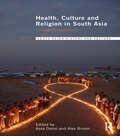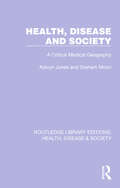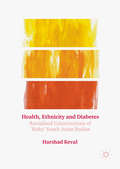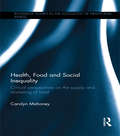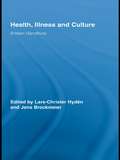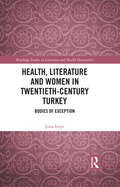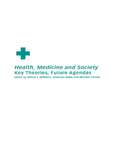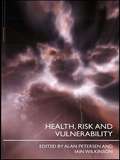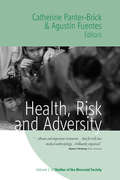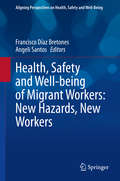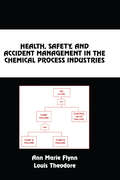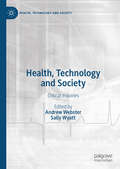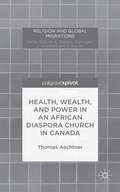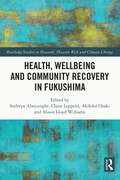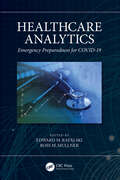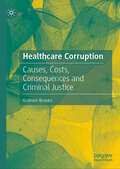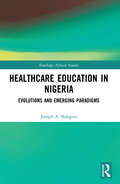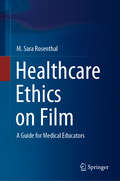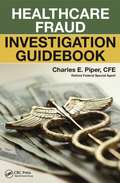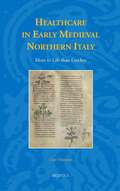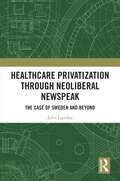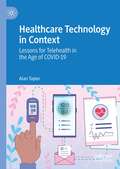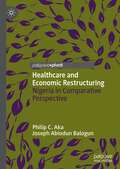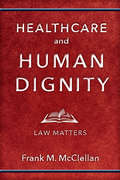- Table View
- List View
Health, Culture and Religion in South Asia: Critical Perspectives (Routledge South Asian History and Culture Series)
by Assa Doron Alex BroomHealth, Culture and Religion in South Asia brings together top international scholars from a range of social science disciplines to critically explore the interplay of local cultural and religious practices in the delivery and experiences of health in South Asia. This groundbreaking text provides much needed insight into the relationships between health, culture, community, livelihood, and the nation-state, and in particular, the recent struggles of disadvantaged groups to gain access to health care in South Asia.The book brings together anthropologists, sociologists, economists, health researchers and development specialists to provide the reader with an interdisciplinary approach to the study of South Asian health and a comprehensive understanding of cutting edge research in this area. Addressing key issues affecting a range of geographical areas including India, Nepal and Pakistan, this text will be essential reading for students and researchers interested in Asian Studies and for those interested in gaining a better understanding of health in developing countries.This book was published as a special issue of South Asian History and Culture.
Health, Disease and Society: A Critical Medical Geography (Routledge Library Editions: Health, Disease and Society #17)
by Graham Moon Kelvyn JonesOriginally published in 1987 this textbook is a comprehensive introduction to the rapidly developing field of medical geography. It illustrates the ideas, methods and debates that inform contemporary approaches to the subject, demonstrating the potential of a social and environmental approach to illness and health. The central theme is the need to reject an exclusively biological approach to health. The authors examine both the geography of health care and outline a selection of health service planning initiatives in both North America and Europe.
Health, Ethnicity and Diabetes
by Harshad KevalThis book explores the often contentious relationship between health, concepts of race and ethnicity, and the impact on South Asian groups. Using medical sociological and anthropological perspectives, it excavates racialised constructions of diabetes 'risk' within discourses, and highlights the contrasting counter narratives in people's accounts of their everyday lives. By identifying a number of components to the discursive, racialised construction of 'risky' South Asian bodies, this book problematises taken for granted understandings of culture, lifestyle and genetic risk. The mobilisation of these mechanisms in health science and interventions result in a racialising gaze, directed at groups already experiencing historically embedded race-related issues. The book situates these constructions of risk against the emergent, fluid and dynamic counter narratives to risk constructions. The new found momentum in genetic science is also critiqued in its formulation of racial-genetic risk, especially in the case of diabetes in South Asian groups, and is identified as perpetuating a series of racializing processes.
Health, Food and Social Inequality: Critical Perspectives on the Supply and Marketing of Food
by Carolyn MahoneyHealth, Food and Social Inequality investigates how vast amounts of consumer data are used by the food industry to enable the social ranking of products, food outlets and consumers themselves, and how this influences food consumption patterns. This book supplies a fresh social scientific perspective on the health consequences of poor diet. Shifting the focus from individual behaviour to the food supply and the way it is developed and marketed, it discusses what is known about the shaping of food behaviours by both social theory and psychology. Exploring how knowledge of social identities and health beliefs and behaviours are used by the food industry, Health, Food and Social Inequality outlines, for example, how commercial marketing firms supply food companies with information on where to locate snack and fast foods whilst also advising governments on where to site health services for those consuming such foods disproportionately. Giving a sociological underpinning to Nudge theory while simultaneously critiquing it in the context of diet and health, this book explores how social class is an often overlooked factor mediating both individual dietary practice and food marketing strategies. This innovative volume provides a detailed critique of marketing and food industry practices and places class at the centre of diet and health. It is suitable for scholars in the social sciences, public health and marketing.
Health, Illness and Culture: Broken Narratives (Routledge Studies in Health and Social Welfare)
by Lars-Christer Hydén Jens BrockmeierThis collection of essays examines the interrelations between illness, disability, health, society, and culture. The contributors examine how "narratives" have emerged and been utilized within these areas to help those who have experienced d injury, disability, dementia, pain, grief, or psychological trauma to express their stories. Encompassing clinical case studies, ethnographic field studies and autobiographical case studies, Health, Illness and Culture offers a broad overview and critical analysis of the present state of "illness narratives" within the fields of health and social welfare.
Health, Literature and Women in Twentieth-Century Turkey: Bodies of Exception (Routledge Studies in Literature and Health Humanities)
by Şima İmşirHealth, Literature and Women in Twentieth-Century Turkey offers readers fresh insight into Turkish modernity and its discourse on health, what it excludes and how these potentialities manifest themselves in women’s fiction to shape the imagination of the period. Starting from the nineteenth century, health gradually became a focal topic in relation to the future of the empire, and later the Republic. Examining representations of health and illness in nationalist romances, melodramas and modernist works, this book will explore diseases such as syphilis, tuberculosis and cancer, and their representation in the literary imagination as a tool to discuss anxieties over cultural transformation. This book places Turkish literature in the field of health humanities and identifies the discourse on health as a key component in the making of the Turkish nation-building ideology. By focusing on the place of health and illness in canonical and non-canonised fiction, it opens a new field in Turkish literary studies.
Health, Literature and Women in Twentieth-Century Turkey: Bodies of Exception (Routledge Studies in Literature and Health Humanities)
by Şima İmşirHealth, Literature and Women in Twentieth-Century Turkey offers readers fresh insight into Turkish modernity and its discourse on health, what it excludes and how these potentialities manifest themselves in women’s fiction to shape the imagination of the period. Starting from the nineteenth century, health gradually became a focal topic in relation to the future of the empire, and later the Republic. Examining representations of health and illness in nationalist romances, melodramas and modernist works, this book will explore diseases such as syphilis, tuberculosis and cancer, and their representation in the literary imagination as a tool to discuss anxieties over cultural transformation. This book places Turkish literature in the field of health humanities and identifies the discourse on health as a key component in the making of the Turkish nation-building ideology. By focusing on the place of health and illness in canonical and non-canonised fiction, it opens a new field in Turkish literary studies.
Health, Medicine and Society: Key Theories, Future Agendas
by Simon J. Williams Jonathan Gabe Michael CalnanTaking as its point of departure recent developments in health and social theory Health, Medicine and Society brings together a range of eminent, international scholars to reflect upon key issues at the turn of the century. Contributors draw upon a range of contemporary theories, both modernist and postmodernist, to look at the following themes: *health and social structure*the contested nature of the body*the salience of consumption and risk*the challenge of emotions Health, Medicine and Society provides a 'state-of-the-art' assessment of health related issues at the millennium and a cogent set of arguments for the centrality of health to contemporary social theory. Written in a clear, accessible style it will be ideal reading for students and researchers in health studies, public health, medical sociology, medicine and nursing.
Health, Risk and Vulnerability
by Alan Petersen Iain WilkinsonThe concept of risk is one of the most suggestive terms for evoking the cultural character of our times and for defining the purpose of social research. Risk attitudes and behaviours are understood to comprise the dominant experience of culture, politics and society in our times. Health, Risk and Vulnerability investigates the personal and political dimensions of health risk that structure everyday thought and action. In this innovative book, international contributors reflect upon the meaning and significance of risk across a broad range of social and institutional contexts, exploring current issues such as: the ‘escalation of the medicalization of life’, involving the pathologization of normality and blurring of the divide between clinical and preventive medicine the tendency for mental health service users to be regarded as representing a risk to others rather than being ‘at risk’ and vulnerable themselves the development of health care systems to identify risk and prevent harm women’s reactions to ‘high risk’ screening results during pregnancy and how they communicate with other women about risk men and the use the internet to reconstruct their social and sexual identities Charting new terrain in the sociology of health and risk, and focusing on the connections between them, Health, Risk and Vulnerability offers new perspectives on an important field of contemporary debate and provides an invaluable resource for students, teachers, researchers, and policy makers.
Health, Risk, And Adversity (Studies of the Biosocial Society #2)
by Catherine Panter-Brick Agustin FuentesResearch on health involves evaluating the disparities that are systematically associated with the experience of risk, including genetic and physiological variation, environmental exposure to poor nutrition and disease, and social marginalization. This volume provides a unique perspective - a comparative approach to the analysis of health disparities and human adaptability - and specifically focuses on the pathways that lead to unequal health outcomes. From an explicitly anthropological perspective situated in the practice and theory of biosocial studies, this book combines theoretical rigor with more applied and practice-oriented approaches and critically examines infectious and chronic diseases, reproduction, and nutrition.
Health, Safety and Well-being of Migrant Workers: New Hazards, New Workers (Aligning Perspectives on Health, Safety and Well-Being)
by Francisco Díaz Bretones Angeli SantosThis volume explores psychosocial problems amongst one of the most vulnerable social groups in our societies, immigrant workers, through a multidisciplinary approach. Migration has sometimes been oversimplified as a flow of workers from “poorer”, developing nations to “wealthier”, industrialised nations. The issue, however, is more complex and currently migration is a global phenomenon in which all countries are recipients of workers from third countries and send workers to third countries. The working conditions of immigrant workers at various levels are not always well known, though some studies have established that the negative impact on migrant workers is cumulative, and primarily stems from adverse living and working conditions in a new country and increased levels of vulnerability. The contributions to this volume cover discussions on migrant workers in the industrial, agricultural and service sectors across the world. They critically study the impact of work Hazards on the health and wellbeing of migrant workers in order to shed light on the social and health implications of migrant work, explore the relation between organizational, psychosocial and work factors, and analyse the migration process from a wider perspective and as a global phenomenon present in every country. The contributors provide multidisciplinary and multicultural contemporary perspectives, thereby providing readers with wide-ranging insights. This volume is of interest to researchers and students from the social and behavioural sciences, particularly those focusing on health studies and migration studies.
Health, Safety, and Accident Management in the Chemical Process Industries: A Complete Compressed Domain Approach
by Louis Theodore Ann Marie Flynn"Analyzes health and hazard risk assessment in commercial, industrial, and refining industries. Emphasizes legal requirements, emergency planning and response, safety equipment, process implementation, and occupational and environmental protection exposure guidelines. Presents applicatoins and calculations for risk analysis of real systems, as well
Health, Technology and Society: Critical Inquiries (Health, Technology and Society)
by Sally Wyatt Andrew WebsterThis book celebrates and captures examples of the excellent scholarship that Palgrave’s Health, Technology, and Society Series has published since 2006, and reflects on how the field has developed over this time. As a collection of readings drawn from twenty-two books, it is organized around five themes: Innovation, Responsibility, Locus of Care, Knowledge Production, and Regulation and Governance. Structured in this way, the book gives the reader a concise but nonetheless rich guide to the core issues and debates within the field. Complementing these narratives, the original authors have provided new reflection pieces on their texts and on their current work. This then is a book which in part looks back but also looks forward to emerging issues at the intersection of health, technology, and society. It uniquely encompasses and presents a range of expertise in a novel way that is both timely and accessible for students and others new to the field.
Health, Wealth, and Power in an African Diaspora Church in Canada
by Thomas AechtnerThis book investigates an African diaspora Christian community in Calgary, Alberta, and explores the ways in which the church's beliefs and practices impact the lives of its migrant congregation. In particular, it reveals the church's pronounced concern with the utility of the Prosperity Gospel and Holy Spirit Power.
Health, Wellbeing and Community Recovery in Fukushima (Routledge Studies in Hazards, Disaster Risk and Climate Change)
by Sudeepa Abeysinghe, Claire Leppold, Akihiko Ozaki and Alison Lloyd Williams Alison Lloyd WilliamsThis book examines the issue of disaster recovery in relation to community wellbeing and resilience, exploring the social, political, demographic and environmental changes in the wake of the 2011 Fukushima disaster. The contributors reflect on the Fukushima disaster of earthquake, tsunami and radiation contamination and its impacts on society from an interdisciplinary perspective of the social sciences, critical public health, and the humanities. It focuses on four aspects, which form the sections of the work: Living with Risk and Uncertainty Vulnerability and Inequality Community Action, Engagement and Wellbeing Notes from the Field The first three sections present research on the long-term consequences of the disaster on community health and wellbeing. These findings are enhanced and developed in the ‘Notes from the Field’ section where local practitioners from medicine and community recovery reflect on their experiences in relation to concepts developed in the previous sections. This work significantly extends the literature on long-term wellbeing following disaster. The case study of Fukushima is a multi-faceted process that illuminates wider issues around post-disaster regeneration in Fukushima. This problem takes on new importance in the context of Covid-19, including direct parallels in the issues of risk measurement, social inequality, and wider wellbeing impacts, which public health disciplines can draw from.
Healthcare Analytics: Emergency Preparedness for COVID-19
by Ross M. Mullner Edward M. RafalskiThe first COVID-19 case in the US was reported on January 20, 2020. As the first cases were being reported in the US, Washington State became a reliable source not just for hospital bed demand based on incidence and community spread but also for modeling the impact of skilled nursing facilities and assisted living facilities on hospital bed demand. Various hospital bed demand modeling efforts began in earnest across the United States in university settings, private consulting and health systems. Nationally, the University of Washington Institute of Health Metrics and Evaluation seemed to gain a footing and was adopted as a source for many states for its ability to predict the epidemiological curve by state, including the peak. This book therefore addresses a compelling need for documenting what has been learned by the academic and professional healthcare communities in healthcare analytics and disaster preparedness to this point in the pandemic. What is clear, at least from the US perspective, is that the healthcare system was unprepared and uncoordinated from an analytics perspective. Learning from this experience will only better prepare all healthcare systems and leaders for future crisis. Both prospectively, from a modeling perspective and retrospectively from a root cause analysis perspective, analytics provide clarity and help explain causation and data relationships. A more structured approach to teaching healthcare analytics to students, using the pandemic and the rich dataset that has been developed, provides a ready-made case study from which to learn and inform disaster planning and preparedness. The pandemic has strained the healthcare and public health systems. Researchers and practitioners must learn from this crisis to better prepare our processes for future pandemics, at minimum. Finally, government officials and policy makers can use this data to decide how best to assist the healthcare and public health systems in crisis.
Healthcare Corruption: Causes, Costs, Consequences and Criminal Justice
by Graham BrooksThis book offers a broad international analysis of healthcare corruption, drawing upon criminology, sociology, psychology, law, political and behavioural economics and nudge theory. It engages with the existing key debates on how to define healthcare corruption and the measurement of it but builds on this and offers new analysis of these issues in the private healthcare sector too. Furthermore, it moves beyond the analysis of funds lost to healthcare and includes the impact and costs of healthcare corruption on victims and family members of victims and the CJS. It also uniquely considers that the healthcare sector victimizes patients and its own employees, with the healthcare sector as part of a carceral state to help highlight how different disciplines can contribute to our understanding in reducing healthcare corruption.
Healthcare Education in Nigeria: Evolutions and Emerging Paradigms (Routledge African Studies)
by Joseph A. BalogunThis book provides a comprehensive assessment of the training of health professionals in Nigeria, looking back to how healthcare education has evolved in the country over time, before investigating new and emerging trends. The book begins with a discussion of the fundamentals of healthcare education, the art of teaching healthcare students, and modelling professionalism in healthcare. The book goes on to highlight the work of pioneer Nigerian healthcare academics, and explores the administration of healthcare education at departmental level. Finally, it highlights the role of elite Nigerian healthcare academics in the diaspora, chronicles contemporary challenges in healthcare education, and makes recommendations for reform. This book will be of interest to students, scholars and practitioners working on healthcare education in Africa.
Healthcare Ethics on Film: A Guide for Medical Educators
by M. Sara RosenthalThis book is a companion to Clinical Ethics on Film and deals specifically with the myriad of healthcare ethics dilemmas. While Clinical Ethics on Film focuses on bedside ethics dilemmas that affect the healthcare provider-patient relationship, Healthcare Ethics on Film provides a wider lens on ethics dilemmas that interfere with healthcare delivery, such as healthcare access, discrimination, organizational ethics, or resource allocation. The book features detailed and comprehensive chapters on the Tuskegee Study, AIDS, medical assistance in dying, the U.S. healthcare system, reproductive justice, transplant ethics, pandemic ethics and more. Healthcare Ethics on Film is the perfect tool for remote or live teaching. It’s designed for medical educators and healthcare professionals teaching any aspect of bioethics, healthcare ethics or the health sciences, including medical humanities, history of medicine and health law. It is also useful to the crossover market of film buffs and other readers involved in healthcare or bioethics.
Healthcare Fraud Investigation Guidebook
by Charles E. PiperSome have estimated that healthcare fraud in the United States results in losses of approximately $80 billion a year. Although there are many books available that describe how to detect healthcare fraud, few address what must be done after the fraud is detected. Filling this need, Charles Piper‘s Healthcare Fraud Investigation Guidebook details not only how to detect healthcare fraud, but also how to investigate and prove the wrongdoing to increase the likelihood of successful prosecution in court.The book starts by covering the history of healthcare insurance and the various types of fraud schemes. It presents Charles Piper‘s unique approach to investigating (The Piper Method) which allows readers to conduct as many as 10 simultaneous investigations for each case. It emphasizes the importance of simultaneously searching for waste and abuse as well as systemic weaknesses and deficiencies that caused or contributed to the problem or wrongdoing under investigation and then make recommendations for improvement. It also provides:Questions to ask whistleblowers, complainants, employers, employees, and healthcare providers who are suspectsTips on investigative case planning, goals, and strategiesSample visual aids for use when briefing others about your investigative findingsGuidance on presenting information obtained from healthcare investigations and on how to testify in courtTechniques for uncovering previously undetected fraudThe book includes a sample case study that walks readers through a mock case from the time the case is received through the end. The case study demonstrates how to initiate, plan, and conduct a thorough and complete healthcare fraud investigation while incorporating Piper‘s proven methodology.Sharing insights gained through Charles Piper‘s decades o
Healthcare In Early Medieval Northern Italy: More To Life Than Leeches (Studies In The Early Middle Ages #26)
by Clare PilsworthAfter the fall of the last Western Roman Emperor in 476 AD, Northern Italy played a crucial role - both geographically and culturally - in connecting East to West and North to South. Nowhere is this revealed more clearly than in the knowledge and practice of medicine. In sixth-century Ravenna, Greek medical texts were translated into Latin, and medical practitioners such as Anthimus, famous for his work on diet, also travelled from East to West. Despite Northern Italy's location as a confluence of cultures and values, modern scholarship has thus far ignored the extensive range of medical practices in existence throughout this region. This book aims to rectify this absence. It will draw upon both archaeological and written sources to argue for redefinitions of health and illness in relation to the Northern-Italian Middle Ages. This volume does not only put forward new classifications of illness and understandings of diet, but it also demonstrates the centrality of medicine to everyday life in Northern Italy. Using charter evidence and literary sources, the author expands our understanding of the literacy levels and social circles of the elite medical practitioners, the medici, and their lesser counterparts. This work marks a significant intervention into the field of medical studies in the early to high Middle Ages.
Healthcare Privatization through Neoliberal Newspeak: The Case of Sweden and Beyond
by John LapidusUsing Sweden as its starting point, this insightful book examines how universal health systems around the world are gradually being eroded by the privatization of provision and funding.This book argues that the influence of commercial interests creates two parallel systems, fatally undermining the principle that public healthcare should be equally available to all citizens. Significantly, it highlights how the language used to describe these neoliberal developments essentially disguises their broader impact, a type of newspeak that frames privatization as a logical response to the pressures faced by welfare states. Each chapter focuses on a different actor, from private healthcare providers to insurance companies, employers, and unions, illustrating the creeping commodification of healthcare not only in Sweden but also internationally.Erudite and incisive, this will be fascinating reading for scholars and students across public health, political science, and beyond.
Healthcare Technology in Context: Lessons for Telehealth in the Age of COVID-19
by Alan TaylorThis book investigates how the technology used by telehealth services shapes our healthcare, and how we, as humans, collectively change and shape the technology and services used in healthcare. Based on extensive field research on telehealth services in Australia and Brazil, the book reveals some surprisingly obvious conclusions about our powers to shape the society.
Healthcare and Economic Restructuring: Nigeria in Comparative Perspective
by Philip C. Aka Joseph Abiodun BalogunThis book explores the intersection between healthcare delivery and national economic health, using Nigeria as case study and window into the world. Specifically, the issue this book tackles revolves around how to repair Nigeria’s dysfunctional healthcare system through the medium of a healthier economy that provides sufficient revenue to meet the healthcare needs of citizens.
Healthcare and Human Dignity: Law Matters (Critical Issues in Health and Medicine)
by Frank M. McClellanThe individual and structural biases that affect the American healthcare system have serious emotional and physical consequences that all too often go unseen. These biases are often rooted in power, class, racial, gender or sexual orientation prejudices, and as a result, the injured parties usually lack the resources needed to protect themselves. In Healthcare and Human Dignity, individual worth, equality, and autonomy emerge as the dominant values at stake in encounters with doctors, nurses, hospitals, and drug companies. Although the public is aware of legal battles over autonomy and dignity in the context of death, the everyday patient’s need for dignity has received scant attention. Thus, in Healthcare, law professor Frank McClellan’s collection of cases and individual experiences bring these stories to life and establish beyond doubt that human dignity is of utmost priority in the everyday process of healthcare decision making.
